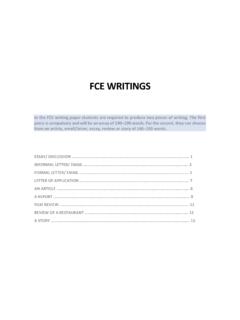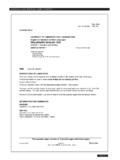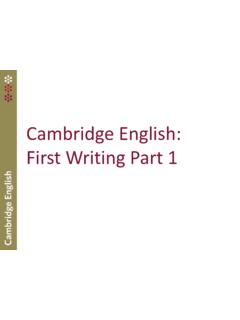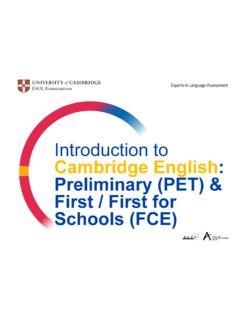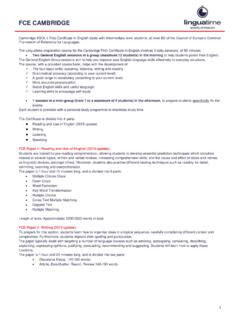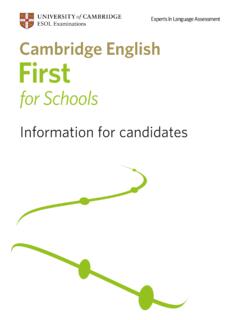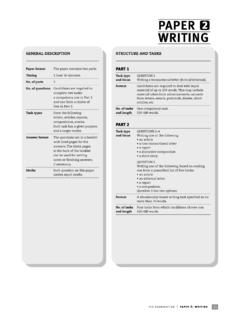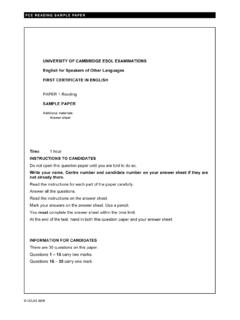Transcription of Top Ten Mistakes in the FCE Writing Paper (And How to ...
1 Top Ten Mistakes in the FCE Writing Paper ( and how to Avoid Them) Neil Harris Copyright Flo-Joe/Neil Harris 2005. All rights reserved. Top Ten Mistakes in the FCE Writing Paper ( and how to Avoid Them) By Neil Harris Top Ten Mistakes in the FCE Writing Paper ( and how to Avoid Them) Neil Harris Copyright Flo-Joe/Neil Harris 2005. All rights reserved. Top Ten Mistakes in the FCE Writing Paper ( and how to Avoid Them) If you re reading this article, you re probably taking the FCE exam. Well done you ve come to the right place! FCE isn t an easy exam, but there are many things you can do to get the score you deserve. You ve already done something really positive to make sure you get the best score you can by reading this article and seeing the other exam tips on the Flo-Joe website so you ve made a great start. By the time you ve finished this article about the FCE Writing Paper ( Paper 2) you ll be in a great position to go into the exam, knowing what to do and what not to do.
2 So, here s the Flo-Joe countdown of the top ten Mistakes in the FCE Writing Paper and how to avoid them. Mistake 1: Not answering the question completely I remember reading recently an apparently fantastic answer to a Part One question. One of my students, Daniela, had written a letter of complaint under timed conditions. (Like Daniela, you too can practise doing a past FCE test under exam conditions so you know what to expect in the real exam.) Anyway, Daniela thought she d done everything we d discussed in class. For example, she had organised her ideas into paragraphs, she had identified the person who was going to read the letter (known as the target reader) and she had used the correct register. So far so good! We were both really pleased with her letter until we checked the question again. It said that she should ask for a refund. Oh no!
3 She moaned, I ve forgotten to ask for the refund. But does it matter? Surely the target reader will know I m unhappy so I guess he ll send me some money back anyway . Unfortunately for Daniela it did matter because she lost marks for leaving out one of the question s content points. Content Points are really important for Part One questions so let s look at this in more detail. (You will know that the FCE Writing Paper is divided into two parts - Part One and Part Two - but what s the difference? Well, Part One is compulsory so you have to answer that question. Part Two gives you a choice of four questions and you have to answer one of them.) Part One is what we call a transactional letter, which means that you are Writing to get a response from the target reader. If you were Writing to complain about something, let s say a faulty computer, and you forgot to ask for a refund, as Daniela did, you probably wouldn t get the response you wanted (in this case, your money back!)
4 In an FCE Part One question, that means you lose marks. Only Cambridge examiners know how many marks you lose for omitting one or more content points, but don t worry, as in a moment I ll tell you an easy way to check if you have included them all.. Top Ten Mistakes in the FCE Writing Paper ( and how to Avoid Them) Neil Harris Copyright Flo-Joe/Neil Harris 2005. All rights reserved. A great way to make sure you have answered the question (and this is true for Part One and Part Two) is to get into the habit of using a highlighter pen and highlighting all the key words in the question you are answering. Think about the content points as well as identifying the person you are Writing to and the type of text you are being asked to write. Try this: have a look at an example of a recent FCE Part One question and you ll notice the handwritten notes around the edge of the page.
5 How many points are there? Count them now. The magic number is FIVE and as long as you remember to cover each of these FIVE points, you won t make the same mistake as Daniela did. FIVE. Yes, that s FIVE content points. One for each of the fingers and thumb of the hand you write with. Remember to look at your hand when you are Writing , and you ll remember the five points you need to cover. Easy! By the way, Part Two questions are slightly different as you won t lose marks in the same way if you leave out a content point. (In Part One the focus is on Task Achievement, which means answering the question.) In Part Two the focus is much more on language. However, the advice from examiners is to make sure you always deal with each part of any question. For example, look out for: bullet points and text in bold in Part Two to help you and you should be OK.
6 Mistake 2: Forgetting to plan You re in the exam room, you ve read the questions and used my advice about checking the content points. Your pen s ready and you re about to start Writing your first answer. STOP! Have you written a plan? No? Then write one right now! There are many different ways of planning mind maps or lists are very popular but the important thing is to know what you are going to write and how to order it before you start Writing the actual answer! (When you have finished your answer, simply cross through your plan so the examiner knows not to read it.) Mistake 3: Taking too much time to answer one question It s really tempting, isn t it, to spend an extra five minutes on one of the questions to make your answer even better? Unfortunately, the small difference this might make to that answer will have a much bigger, and negative effect, on your mark for the other question.
7 If you do Part One first, make sure you have included all the content points and then move on to Part Two after forty-five minutes. An extra five minutes won t make a big difference to your score in Part One! Indeed for examiners, there s nothing more disappointing than reading an excellent Part One answer by a candidate and then finding a really short Part Two answer. (Remember, if you write much fewer than 120 words in Part Two, you re going to lose marks, so get lots of practice at Writing to the time limit. There s nothing worse than having to write to a time limit for the first time if it s during the exam itself!) Top Ten Mistakes in the FCE Writing Paper ( and how to Avoid Them) Neil Harris Copyright Flo-Joe/Neil Harris 2005. All rights reserved. Mistake 4: Not allowing time to check your answer It s really important that you use your time well in the exam.
8 Remember you only have ninety minutes for both questions! Good candidates leave time to proofread (check) their answers so this is something you should do, too. As you have forty-five minutes for each question, try to leave at least five minutes to check. I remember a few years ago an FCE candidate asking me how he could check his answer for Mistakes . You re the teacher, not me, so how can I find the Mistakes I ve made? The solution is easy: start making a frequent error checklist. This is a list of the Mistakes you make most or every time you write. It might be a spelling mistake (accomodation instead of accommodation) or overuse of the present continuous when you need a present perfect continuous. (*I m working in Hamburg since five years instead of I ve been working in Hamburg for five years is a mistake I often see). When you know your frequent Mistakes , make a mental list of them and check for these in the exam.
9 Are you worried that if you make corrections then your exam Paper will look a mess? Here s another tip: If you write your answer on alternate lines, you can cross out the Mistakes and have room for the corrections when you are checking. This is a really quick and simple way to avoid losing marks for accuracy! Mistake 5: Using too much of the input material (otherwise known as lifting ) What do we mean by input material? Simply this - the input material is the language that is used to write the question. If you use the same language in your answer without trying to rephrase it, it creates an impression of weakness in the mind of the examiner. In Part One, the handwritten notes which you can see around the edge (how many? If you forget, go back to Not answering the question and check!) should be used to stimulate your own ideas and language!
10 You can be sure that the people who write the exam questions already know English really well, so it s YOUR English the examiners want to read! Try not to repeat the exact words and phrases from the question. and remember to develop the points with your own ideas. Mistake 6: Not knowing the text types Can you list the main text types which you are expected to know for the FCE exam? If not, go and check as this will help you to know what you are expected to write in the exam. Part One is a transactional letter (either formal or informal). In Part Two, there s a wider choice of text types, but the common ones are articles, non-transactional letters, reports, discursive compositions (a discussion essay) and short stories. You therefore need to know the features of each text type. Top Ten Mistakes in the FCE Writing Paper ( and how to Avoid Them) Neil Harris Copyright Flo-Joe/Neil Harris 2005.
